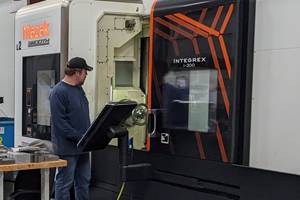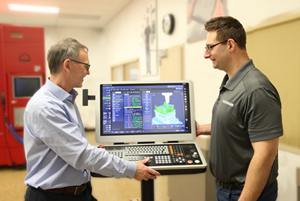Online Benchmarking Site Helps Shops Price Metals More Effectively
Price Dynamics is designed to overcome pricing uncertainties when it comes to buying raw materials.
Share




The “fair market price” for metals and raw materials is determined by the market—what machine shops and fabricators are, in fact, paying for their materials. The challenge for most material buyers is that it is very difficult to know what other buyers are paying. A supplier’s list price or catalog price may be out of line with “the going rate,” leading unwary buyers to spend more than they need to or fail to negotiate the best price.
Price Dynamics, an online price benchmarking service developed by Supply Dynamics LLC (Loveland, Ohio), seeks to overcome this pricing uncertainty. The website (pricedynamics.com) is described as an anonymous “gathering place” where many metals buyers from dozens of industries can compare prices for widely used ferrous and nonferrous metals, and evaluate numerous sources of supply. According to Trevor Stansbury, president and founder of Supply Dynamics, the key lies in leveraging the buying information collected from a “community of peers” consisting of job shops, fabricators, contract manufacturers, tool and die shops and small or medium-sized production companies. “The idea is to leverage a vast community of metals buyers and their pricing history to bring price transparency to the marketplace,” Mr. Stansbury says.
He goes on to explain that when someone purchases a car, the person typically consults the online equivalent of Kelly Blue Book or Autotrader, and then compares the prices for vehicles of a similar year, make and model. In the same way, his price benchmarking site provides statistics about what others are paying for raw materials, taking into account factors such as form, grade specification, transaction size or quantity. By collecting and analyzing information about what buyers have paid or been quoted while making similar purchases, a more reliable fair market price emerges.
By using the site, buyers gain access to basic benchmarking functionality. After registering, each buyer is prompted to submit information about what metals that particular buyer is purchasing and at what price or quoted price. In such “crowdsourcing” applications, content is generated by soliciting reports from a large group of participating buyers. The site combines information to identify prevailing price levels and makes these insights available to the group.
Once the user enters the requested information, an animated dial appears that displays how the submitted price compares to prices for similar purchases by others. Information such as high, low, mean and average transaction price is also displayed. Results are accessible on a desktop, laptop, tablet or mobile device. Mr. Stansbury states that the service can benchmark a range of material forms and structural shapes, alloys and grades including tool steels, carbon steel, aluminum, brass, bronze, cobalt, nickel, stainless steel and titanium.
There is no charge for basic membership and the basic price-comparison reports. Premium- and enterprise-level memberships are also available for a fee. The premium-level subscription provides comprehensive reports and filters with which to parse results, save purchasing history and identify alternate material suppliers. The enterprise-level subscription enables large OEMs to integrate the benchmarking service with enterprise resource planning systems and in some cases, to connect with other participants in the extended supply chain.
Related Content
4 Commonly Misapplied CNC Features
Misapplication of these important CNC features will result in wasted time, wasted or duplicated effort and/or wasted material.
Read MoreContinuous Improvement and New Functionality Are the Name of the Game
Mastercam 2025 incorporates big advancements and small — all based on customer feedback and the company’s commitment to keeping its signature product best in class.
Read More5 Tips for Running a Profitable Aerospace Shop
Aerospace machining is a demanding and competitive sector of manufacturing, but this shop demonstrates five ways to find aerospace success.
Read MoreGenerating a Digital Twin in the CNC
New control technology captures critical data about a machining process and uses it to create a 3D graphical representation of the finished workpiece. This new type of digital twin helps relate machining results to machine performance, leading to better decisions on the shop floor.
Read MoreRead Next
5 Rules of Thumb for Buying CNC Machine Tools
Use these tips to carefully plan your machine tool purchases and to avoid regretting your decision later.
Read MoreSetting Up the Building Blocks for a Digital Factory
Woodward Inc. spent over a year developing an API to connect machines to its digital factory. Caron Engineering’s MiConnect has cut most of this process while also granting the shop greater access to machine information.
Read MoreBuilding Out a Foundation for Student Machinists
Autodesk and Haas have teamed up to produce an introductory course for students that covers the basics of CAD, CAM and CNC while providing them with a portfolio part.
Read More































